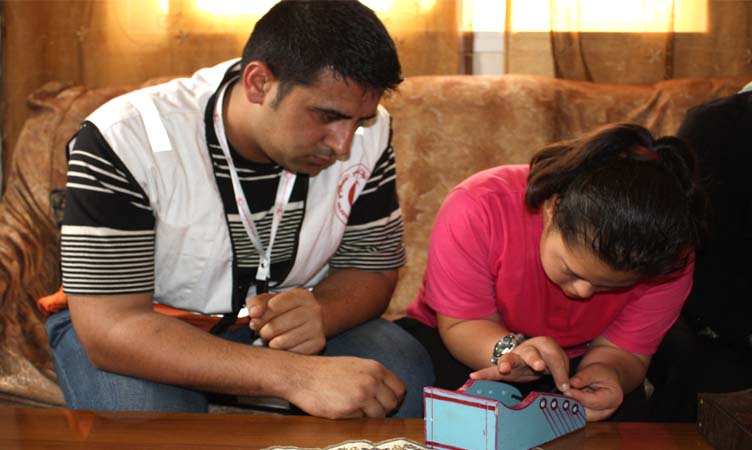Ramallah- Through a series of programs and activities, the PRCS Home Enrichment program, which is run by the Rehabilitation and Ability Development Department, has become the gateway for individuals with mental retardation to their society.
From the moment this program knocked the doors of the Muhammad Shahwan family in Habla, in the Qalqilya district, its 19 year old son Ahmad who suffers from a mental impairment, turned into an active member of the society, able to work with others, and to take care of his personal needs.
Ahmad’s world, prior to the arrival of Fawziyah Hijjawi, the PRCS social worker, was confined to his house. She taught him how to draw and write, and walked with him as he took his first steps out of the house and blossomed into an independent individual.
Um Ahmad [his mother] describes Fawziyah’s work saying, “she treated him like a brother, he trusted and listened to her; she taught him how to read and write, and took him outside to meet people, buy from shops, and interact with the community.”
She adds that Ahmad has become an independent individual; he goes out on his own and even shops for the house, Fawziyah taught him how to shave and he has become more energetic and could do more things on his own.
Rawiya, his sister, remarked in a similar manner saying that the relationship between Ahmad and the family has changed totally, he has become more cooperative and was able to assimilate things better, which made his life and the lives of others much easier.
The program was not limited to Ahamd and his family, which was eager to help him get out of his solitude, it transcended to reach the surrounding community; people changed from being sarcastic bystanders to supporters. According to Rawiya, Fawziyah’s work, and her colleagues in the Home Enrichment program, has significantly affected the way the community perceived her brother, not just in his immediate surroundings but in the town as a whole; people have become more receptive of and helpful to Ahmad.
Ahmad, whose face was glowing with happiness, thanked Fawziyah for all the work she had done with him in the pervious months, saying “I love auntie Fawziyah, and I want her to visit me a lot.”
“I worked with Ahmad for six months on self care, cognitive skills, self expression, social interaction, as well as some academic activities such as reading and writing” says Ms. Hijjawi. She adds that “after working with Ahmad and his family, I followed up on and supervised the family as it continued with the work my colleagues and I had started. We also made sure that Ahmad partakes in the different activities and events organized by PRCS.”
The change happening in Ahmad’s family is no different from that taking place in the Kamel Hamad family in Kufur El Labad, in the Tulkarem district, whose 12 year old daughter, Rasha, suffers from a mental impairment and attends the 5th grade at the local school.
Mu’taz Jum’a, the PRCS social worker, and his colleagues at the Home Enrichment program have worked on the social integration of Rasha through assisting in developing her academic skills such as math and reading, as well as her self care and personal hygiene abilities. Mu’taz and his colleagues have gone beyond the borders of the family home. They taught Rasha how to differentiate between the different money bills and how to help in her father’s grocery shop; they worked with her schoolmates and formed a friendship support group from her peers.
Haj Abu Abdullah, Rasha’s father, says that “she has totally changed after Mu’taz and his team arrived at our house; their presence has become a motive for her to develop and interact with the community, she responded to Mu’taz and cooperated with him, now she eagerly awaits his arrival each time.”
Rasha’s mother, confirmed that by saying that Rasha has become more curious about things and has been noticing everything as she helped her in her daily chores and helped her father at the grocery shop; she says that she has become better equipped to deal with her family and friends, and that even her conversation and pronunciation skills have improved.
Rasha, as she sat next to Mu’taz, said that “I have become really good at school, and my friends love me more.” Mu’taz, on the other hand, remarked that [he] “has worked with Rasha for five months on academic and fun activities as well games to develop her fine motor skills so that she could hold things and move them.” He added, “Rasha could not focus both academically and on the social level, now her academic achievement has improved and she is well integrated in her school community through the support group we formed from teachers and students. Rasha can now memorize things and deal with numbers, letters, and money bills.”
The Home Enrichment program, run by PRCS in partnership with the Norwegian Red Cross and the Swedish Red Cross, according to its coordinator, Ammar Ajrami, is made up from 260 activities that focus on self care, fine motor skills through games and writing, gross motor skills such as running and climbing, expressional and cognitive languages as well as social interaction and sensory responsiveness.
Ajrami added that each specialist is assigned his/her case after a field survey is done and after target locations are identified. Moreover, working with children is done with the full cooperation and participation of parents who are later supervised as they continue the work.
Ahmad and Rasha are just two examples of hundreds of children with mental disabilities that have been part of the Home Enrichment program since 2000, a program that has made parents key partners in the development of their children’s abilities and their integration in the community.
